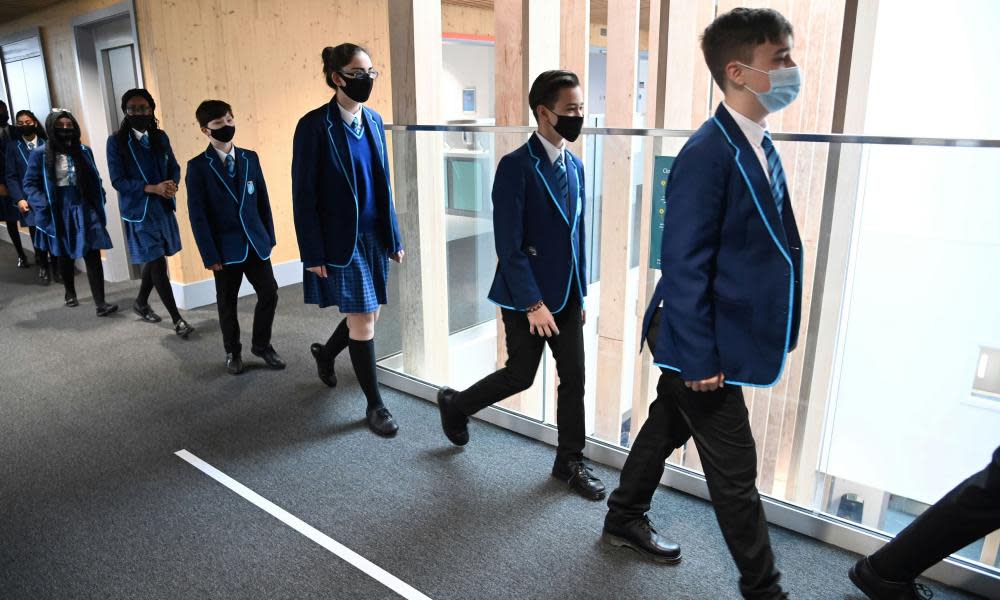Teachers call for masks to be mandatory in English secondary schools

Heads say advice is ‘too vague’ as sceptical MPs warn additional Covid restrictions will cause ‘chaos’
Teachers are calling for face masks to be mandatory for secondary school pupils in England and extended to include classrooms, amid pushback from sceptical MPs who have warned additional Covid restrictions will cause “chaos” for pupils.
According to new government guidance in response to the Omicron variant, masks are merely “recommended” in communal areas and corridors in schools rather than compulsory. In contrast, face coverings will be mandatory on public transport and in shops from Tuesday.
Head teachers say the advice for schools is “too vague”, making it difficult to enforce effectively as parents and pupils can legitimately refuse to comply, leaving it up to school leaders to deal with confusion and dissent in schools.
“It’s very difficult to manage on the ground,” said Richard Sheriff, the executive headteacher of Harrogate grammar school and chief executive of the Red Kite Learning Trust. “Any parent or child can say, ‘You can’t make me. It’s not compulsory.’” He told the government: “Make it obligatory by law, as we are doing in other places like transport.”
default
The National Education Union (NEU) and the NASUWT teachers’ union, which represent the vast majority of teachers in England, say the government guidance should go further, extending mask-wearing to classrooms.
Dr Mary Bousted, NEU joint general secretary, said: “Covid does not recognise the difference between a corridor and a classroom, and a failure to require face coverings in both areas in secondary schools is a mis-step in the latest guidance.” Dr Patrick Roach, NASUWT general secretary, agreed: “If schools are to maintain safety during the remainder of this term, the government will need to accept that its messaging needs to be stronger.”
Glyn Potts, the headteacher at Blessed John Henry Newman College in Oldham, Greater Manchester, said masks had been in place in communal spaces in his school for some time in response to enhanced measures locally. “There is a little bit of fatigue among parents and students, but we’ll have to battle that.
“We are back to handing out masks before they gain entry to the school and hopefully the parental support will remain, but they are starting to get a little bit frustrated at what they see as measures that are dropped on them.”
The government made similar recommendations on face coverings in communal spaces in universities in guidance published on Monday, but it says higher education institutions may also want to consider using face masks in workshops, laboratories, libraries and lecture halls, especially where social distancing is difficult to maintain. In addition, international students travelling from red-list countries will be required to quarantine in a managed hotel on arrival to the UK for 10 days.
Related: Travellers’s Q&A as new measures are announced to tackle Omicron Covid variant
Under the new restrictions, close contacts of those who test positive for Omicron will have to self-isolate for 10 days, including children, which has led to warnings that thousands of healthy children will be forced to stay at home and study online, causing further widespread disruption to education.
Steve Baker, the deputy chairman of the Covid Recovery Group, told the Telegraph the new measures “will cause chaos including collateral harms like damage to children’s education”.
In interviews on Monday, the education secretary, Nadhim Zahawi, insisted closing schools was the “last possible option”. He also disagreed with bringing back class bubbles to contain infection spread and encouraged primary schools to press ahead with their nativity plans.
“The best place for children to be is in a classroom, learning,” the former vaccines minister told ITV’s This Morning programme: “Keep schools open: do all the things necessary, like face masks in communal areas … to protect the education in the classroom.”
According to a new poll, more than a quarter of primary school teachers (27%) say their school is planning an online nativity, one in 10 say they are not planning a nativity at all, while 55% are hoping to invite visitors to watch their nativity in person. The poll of 1,711 primary school teachers in England was carried out by Teacher Tapp and shared with PA.

 Yahoo Movies
Yahoo Movies 
